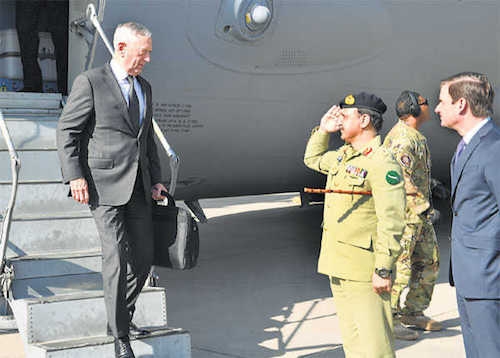
By Lt-Gen Bhopinder Singh (retd)
Given the insipidities and banalities of diplomatic-speak, ‘do more’ is as direct an expression of dissatisfaction that the US can convey to Pakistan, given the American compulsions.
The slyest foreign policy warrior, Henry Kissinger, propounded the term ‘constructive ambiguity’ to describe the language of diplomacy that seeks to disguise, retain and still suggest the actual intent in a construct-of-words that are generally palatable (allowing some concessions), yet, allude to future necessity of actions towards a certain goal. The art of diplomatic wordsmithing has been tested to its limits in the Indian subcontinent, given the irascible tempers and the evolving narrative that besets the tempestuous fundamentals in the trilogy of the US-Pakistan-India equations.
In 1971, as National Security Adviser, Henry Kissinger had underlined the US position and bias in the Indo-Pak war by stating, “We’re in the position where a Soviet stooge, supported with Soviet arms, is overrunning a country that is an ally of the United States.” The cold war binaries had cemented the Pakistani status as a ‘major non-NATO ally’, and then the annexation of Afghanistan by the USSR in 1979 had led to the largest covert joint operation in history, ‘Operation Cyclone’, — the US and the murky General Zia-led Pakistani establishment funded, trained and supplied manpower and weaponry to mujahideen.
Later, the end of cold war and the disintegration of the USSR ensured the selfish and thoughtless withdrawal of interest and bankrolling in the region by the US. However, the kettle of intrigues and virulent religiosity was kept boiling by the shadowy Pakistani-ISI to fertilize the environment into a breeding ground for terrorists, who today haunt the subcontinent, and beyond.
Like in Afghanistan, the US, after achieving its limited objectives in the Gulf wars, left a festering trail of destruction and chaos for the germination of the uber-intolerant and militant pan-Islamism that manifested in the unprecedented tragedy of 9/11, which recalibrated the global equations, thereafter. The decades-old cold war wiring in the US-Pakistan-India underwent a sudden relook and the inter-nation expectations, conversations and transactions underwent a complete re-haul.
The Pakistanis, under General Musharraf, were embarrassingly coerced into joining the global ‘war on terror’ as George W Bush threatened Pakistan with bombing, ‘into the stone age’, should it fail to cooperate. Expected reluctance emanated from the sudden retraction from the consistent Pakistani position, e.g. treating terror organizations as ‘state assets’ and the principle of ‘strategic depth’ in Afghanistan — the half-hearted Pakistani commitment soon exposed its machinations as a double-dealing ‘ally’. The ‘taking out’ of Osama bin Laden from Abbottabad, continuing drone attacks on to Pakistani territories and the parallel warming of the Indo-Afghan ties further vitiated the US-Pakistani equation. It led the Secretary of State, Hillary Clinton, to specifically ask the Pakistanis to ‘do more’ and ‘squeeze’ out terror networks by famously stating, “You can’t keep snakes in your backyard and expect them only to bite your neighbors. Eventually, those snakes are going to turn on whoever has them in the backyard.” The subtext of subsequent US-Pakistan conversations, have remained fixated on the expression of ‘do more’, much to the irritation of Pakistanis.
In the 2016 presidential campaign, Trump had maintained his line of fire, saying, “Pakistan is a very very vital problem and really vital country for us because they have nuclear weapons and they have to get a hold of the situation.” Nearly one year into his presidency, Trump’s insistence on Pakistan to change its tracks has found expression in a persistent and forceful ‘do more’.
Perforce, the US has to maintain a functional working relationship with Pakistan to sustain its operations, manpower and assets in Afghanistan and within the Pakistani narrative. The expansive import of ‘do more’ within the context of diplomatic language suggests both a perfunctory acknowledgement of efforts by the Pakistanis (critical to retain engagement), and yet clearly points to insufficiency of efforts on account of doing the needful. Often, Trump’s bluster results in a brazen statement, like: “We are paying Pakistan billions and billions of dollars; at the same time, they are housing the very terrorists that we are fighting. But that will have to change.”
This leads to an equally jarring counter-narrative from the Pakistanis who decry the American hypocrisy and selective amnesia to remind the US of its historical support for jihadism in the 80s. However, the fact that the playing field, cards and the essential game of the 21st century have evolved but the Pakistanis remain fixated to the dynamics of the earlier times, that is haunting the Pakistanis the most.
‘Do more’ is also contextualized to future aid as the promised $250 million in military aid to Pakistan is withheld, subject to further evidence of Pakistani actions. The chorus for ‘do more’ was echoed by US Secretary of State Rex Tillerson in October when he reiterated that Pakistan must do more to eradicate militants in its country.
In November, the commander of the NATO-led coalition in Afghanistan, Gen John Nicholson continued to lament, “Haven’t seen any change yet in their behavior”, and earlier this month, Defense Secretary Jim Mattis goaded the Pakistanis to “redouble” efforts and urged for the “need to move forward with issues at hand.” Given the banalities of diplomatic-speak, ‘do more’ is as direct an expression of dissatisfaction that the US can convey to Pakistan. With the ongoing specter of a free-run for the internationally designated terrorists, seminaries spewing hatred, state supporting extremist ideologues and the still selective action against terror organizations, the pressure from the Americans to ‘do more’ will remain relentless and cryptic. India needs to reassure and satisfy itself with the American pressure of ‘do more’ as its implied context is deeply suggestive, perceptive and conducive to the change required in the situation in Pakistan.





Be the first to comment